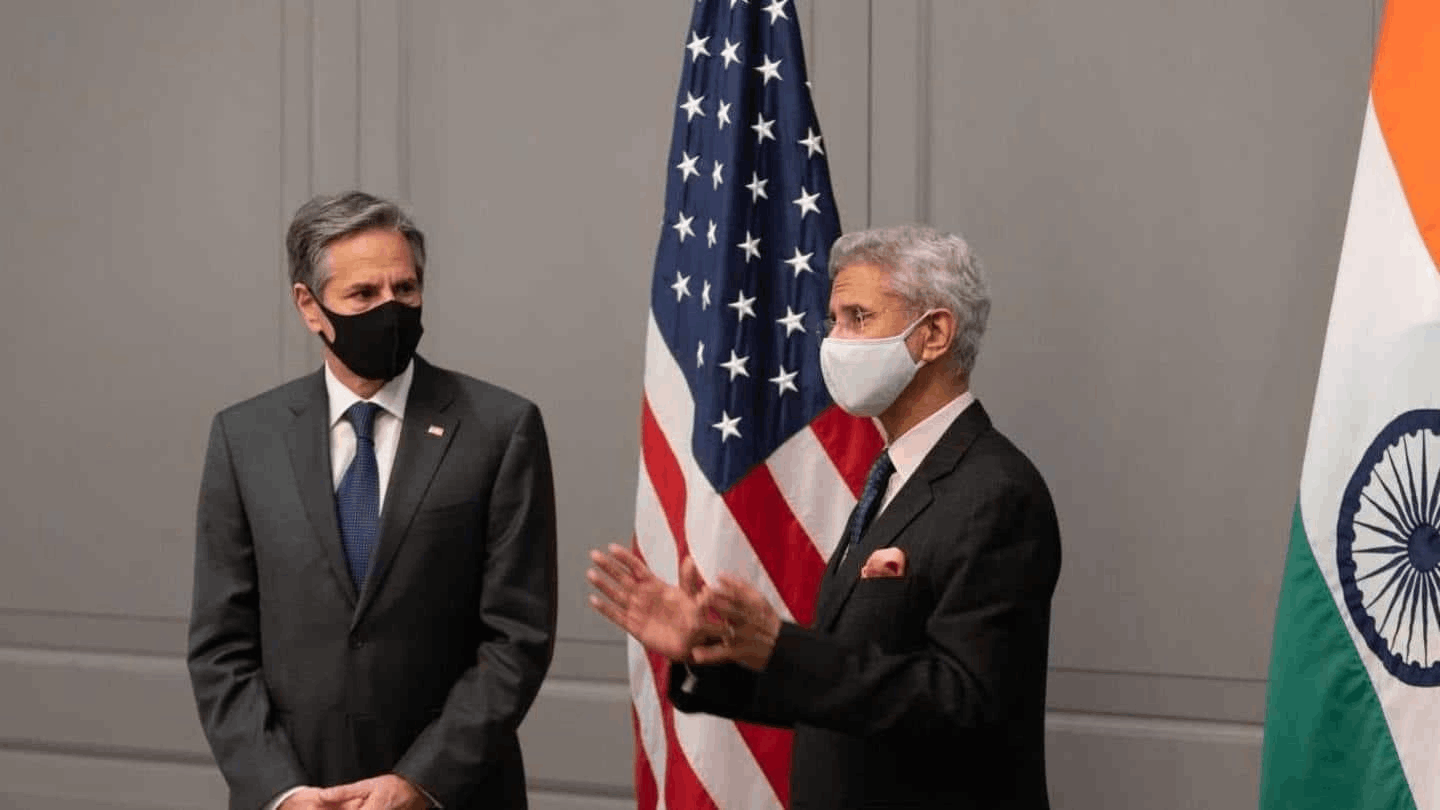Blinken blinks on human rights in Delhi visit
On his day-long debut visit to India, United States Secretary of State Anthony Blinked arrived in New Delhi earlier this week and met Prime Minister Narendra Modi, Minister of External Affairs S Jaishanker and other prominent players during a civil society roundtable, which included representatives of various faiths and Supreme Court lawyer Menaka Guruswamy.
Although Blinken’s visit lasted less than 24 hours, it signified an important step in US-India relations as it was the highest-level contact between the US and India since the Biden administration came to power.
According to US State Department Spokesperson Ned Price, the main topics discussed were efforts to strengthen US-India strategic partnership, Covid-19 relief efforts, climate change, and regional security through US-Australia-India-Japan Quad consultations. However, although Washington had announced before the visit that Blinken would raise issues of human rights and democracy, the topic was mysteriously missing from media reports on the meeting as well as statements from the politicians involved.
Certain sources revealed that civil society representatives had expressed their views on contentious issues such as the Citizenship Amendment Act, harassment of inter-faith couples and the on-going farmers’ protest, but solutions or reprimands on these matters were inexplicably avoided in statements made after the meeting.
In Blinken’s opening remarks at the roundtable, he said that “all people deserve to have a voice in their government” and in the midst of the rising threat to global democracy, especially in the world’s two biggest democracies, these freedoms “are fundamental tenets of democracies.” But when asked about India’s unclear stance on the data privacy and sedition scandal that has rocked the world since Pegasus spyware was exposed, Blinken ducked the elephant in the room, saying “There’s a distinction between regulating misinformation in cyberspace as opposed to political speech.”
Ashok Swain, professor of peace and conflict research at Uppsala University, says that this was not such an unexpected response as Blinken, who is more an international diplomat rather than a politician, was bound to use tactful language.
“It was the US Secretary of State Blinken’s first visit to India. I don’t think anyone in the USA or India had expected that he would openly lecture Indian leadership on democracy and human rights issues. However, he has given subtle hints that USA is concerned over the decline of democracy and increasing human rights violations in India,” Swain tells Media India Group.
Others were not as convinced on Blinken’s tight-lipped strategy, with a few prominent media persons panning Blinken’s middle-of-the-road proclamations.
Rana Ayyub, an Indian journalist at The Washington Post, tweeted, “Secretary Blinken is clearly living in an alternate world,” calling him out for his statement about Americans admiring India’s “steadfast commitment of its people to democracy, pluralism, to human rights and fundamental freedoms.”
This approach is especially surprising considering that since the Bharatiya Janata Party came into power in 2014, numerous American institutions like the US Congress and several media houses have criticised India for its handling of such human rights issues. The New York Times for example, has reported on several of these issues, calling the Modi government’s policies “authoritarian and divisive.” However, the top diplomat of the United States thought it fit to give these matters a miss, despite the ideal opportunity to discuss it and make the United States stance clear.
“Blinken’s meeting with India’s foreign minister, national security advisor, and even the prime minister took place behind closed doors, so we can only speculate what he said to Indian leadership in those meetings. Though Indian media has mostly avoided it, the international media have reported that Blinken has communicated US reservations on human rights issues to the Indian leadership. Either way, it is certain that this administration cannot possibly keep its eyes closed to the minority situation in India due to increasing civil society pressure in the USA, particularly from a powerful group with the Democratic Party itself,” says Swain.
Another controversial outcome of the meeting was Blinken’s decision to meet separately with Ngodup Dongchung, the Tibetan spiritual leader’s representative in New Delhi. This clearly stresses the importance of Tibet-China conflict to the US. Some analysts suggest that the United States was keen to have India toe its own line on the biggest US bugbear – China – and if it had to sacrifice or turn a blind eye to democracy and human rights to keep Modi in good humour then so be it. For example, Global Times, an official Chinese daily, opined that “Blinken’s visit to India demonstrated the US’s intention of roping in India in containing China.”
“The US still sees India as an ally in its competition for global influence with China. In some aspects, it plans to use India to contain China. Blinken’s meeting with Dalai Lama’s representative in New Delhi is a clear sign that the USA expects India to play the Tibet card,” explains Swain, adding, “There is no doubt that the China factor helps India avoid the Biden administration’s open censure. However, India’s declining economy and growing internal troubles do not guarantee this informal waiver for long.”
Often, global democracies and media are the main players that can keep a country’s internal affairs in check. If a powerful nation like America, which has one of the strongest human rights frameworks, turns a blind eye in the name of diplomacy, it sets a dangerous precedent and allows political leaders more freedom to switch to autocratic tendencies. However, some experts believe that the US is definitely keeping an eye on the situation, aided by ordinary citizens who are increasingly raising their voice against any political wrongdoing.
“Undertaking such a short trip to India and decide to meet a group of civil society leaders even before meeting his Indian counterpart show that the Biden administration, even if it is not saying openly, is no way keeping its eyes closed to what is happening inside India, very much unlike the previous Trump administration used to do,” says Swain.










